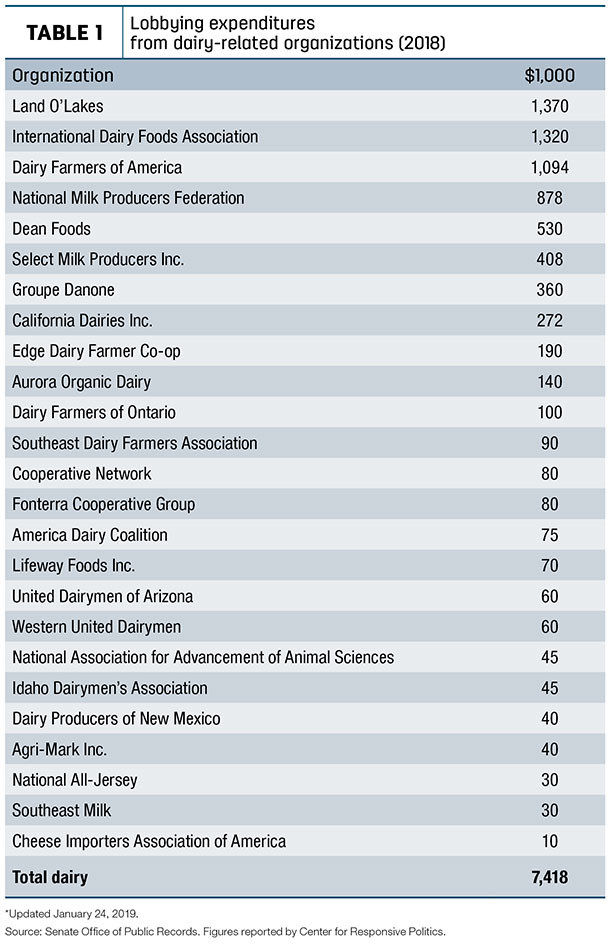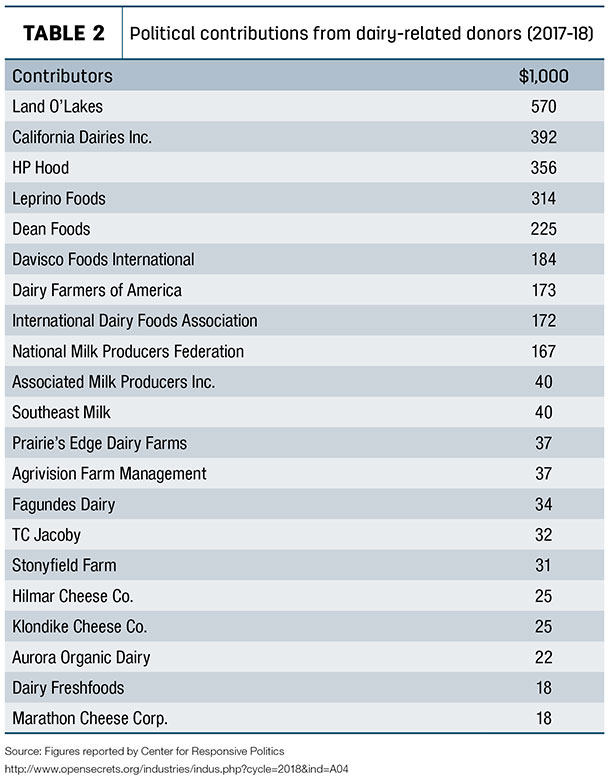The research group tracks money spent in U.S. politics, posting latest lobbying and political contribution spending totals by dairy organizations and companies at OpenSecrets.org.
Lobbying
The lobbying data is compiled from the Senate Office of Public Records. As of data uploaded on Jan. 24, 2019, dairy organizations and companies spent $7.418 million on lobbying in 2018, compared to $6.01 million in all of 2017.
Highest dairy lobbying totals are generally tied to years in which a federal farm bill is up for debate. Lobbying attributed to dairy organizations peaked at $8.35 million in 2013, the year prior to the 2014 Farm Bill.
Land O’Lakes topped the dairy lobby list, although the cooperative covers a wide range of agricultural and food industries. Among dairy groups, other leading spenders were the International Dairy Foods Association, Dairy Farmers of America and the National Milk Producers Federation (Table 1).
Political contributions
Total dairy industry contributions to national political parties and candidates were estimated at about $3.52 million, down from the $4.06 million spent during the 2015-16 election cycle, which included a presidential election. Dairy ranked 78th among major industries in terms of total political contributions in the 2017-18 cycle.
Among dairy groups, leading political contributors were Land O’Lakes, California Dairies Inc., HP Hood, Leprino Foods and Dean Foods (Table 2).

All donations took place during the 2017-18 election cycle and were released by the Federal Election Commission on Feb. 1, 2019.
The contribution estimates are based on contributions from donors (individuals as well as corporations and unions that give directly from their treasuries) to outside groups and from political action committees (PACs) and individuals giving more than $200 to candidates and party committees. In many cases, the organizations themselves did not donate; rather the money came from the organization’s PAC, its individual members or employees or owners and those individuals’ immediate families. Organization totals include subsidiaries and affiliates.
Taking a deeper dive into the political contributions, about $2.7 million of the $3.52 million total in 2017-18 was contributed to members of Congress. Of that, incumbents received $2.3 million.
In the past four two-year election cycles (2011-12, 2013-14, 2015-16 and 2017-18), Republicans have received about 75 percent of contributions attributed to the dairy industry. In the 2017-18 cycle, Democrats received $750,000; Republicans received $1.944 million.
Candidates seeking seats in the House of Representatives received $1.826 million: Democrats received about $382,500; Republicans received about $1.443 million.
Among the top five House recipients for 2017-18, three were California Republicans: Reps. David Valadao ($152,947), who was defeated; Devin Nunes ($108,654); and Jeff Denham ($94,250). Rep. Mike Conaway (R-Texas), new ranking member on the House Ag Committee, was fourth ($65,250); and Rep Collin Peterson (D-Minnesota), new chair of the House Ag Committee, was fifth ($54,500).
Candidates seeking Senate seats received about $490,400: Democrats received about $288,625, Republicans received about $199,350, and Independents received $2,454.
The top three individual recipients of dairy-related contributions in the Senate were Democrats and women: Senate Ag Committee ranking member Debbie Stabenow (D-Michigan), $61,200; Sen. Amy Klobuchar (D-Minnesota), $50,180; and Sen. Tammy Baldwin (D-Wisconsin), $38,200.
The 2018 election was the most expensive midterm ever by a large margin, with total spending surpassing $5.7 billion. ![]()

-
Dave Natzke
- Editor
- Progressive Dairyman
- Email Dave Natzke






